Dropbox vs SharePoint Comparison 2026
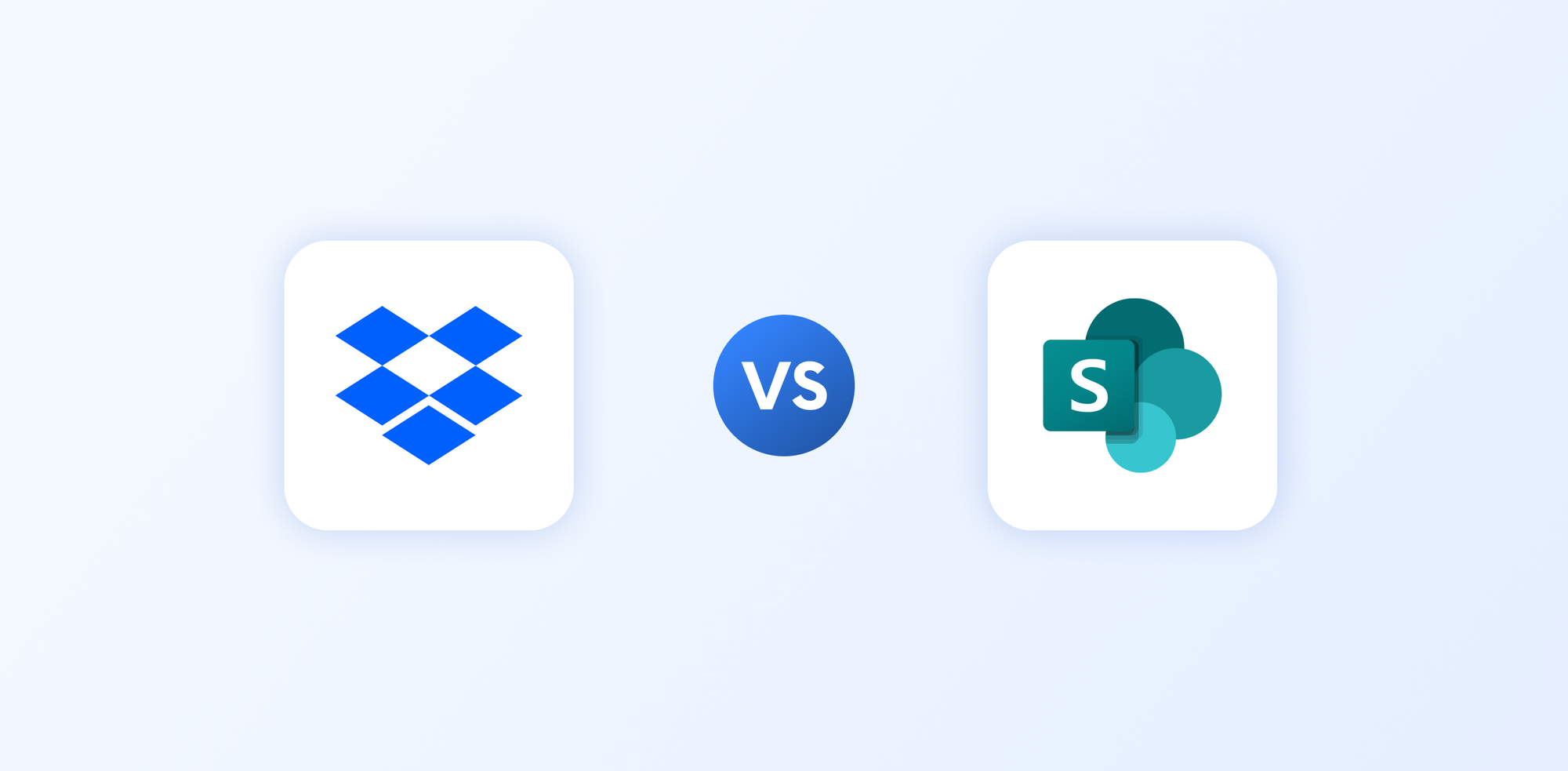
If you’re in the market for cloud storage for personal, business, or enterprise use, some names that could have made your list are Dropbox and SharePoint. Both offer similar services, but have different features and prices that you would have to consider before committing to either option.
To make this decision easier, this article will cover:
- Dropbox vs SharePoint
- Key features, similarities, and differences
- Pricing
- Alternative to Dropbox and SharePoint
Once we’ve covered these topics, you can make the right choice for your personal or business cloud storage needs, or pick an alternative to Dropbox and SharePoint to help you store and share files safely and get increased online privacy.
Table of contents
- Dropbox vs SharePoint overview
- Dropbox vs SharePoint pricing
- Dropbox vs SharePoint differences
- Alternative to Dropbox and SharePoint
- Dropbox vs SharePoint: How to decide
- Dropbox vs SharePoint related articles
Dropbox vs SharePoint overview
Before we explore the theme of Dropbox vs SharePoint in more detail, below you can find a general overview of both services to identify which one has the features that may better suit your needs.
What is Dropbox?
- Cloud storage & sync: Store files in the cloud and choose from multiple syncing options.
- Free tier: Dropbox offers less storage than most of its competitors, at 2GB.
- File versioning & recovery: Dropbox includes file version history, giving you the ability to restore older versions or deleted files from 30 days and up to 365 days on higher tiers.
- Sharing & collaboration: Share files and folders, and control editing features for these files.
- Security: Dropbox provides AES-256 encryption and enterprise-grade security controls, with additional features for business users.
- Integration & search: Enhanced search capabilities via AI, including searching within video and image content. Dropbox also integrates with multiple third-party apps and services.
- Mobile & desktop access: Apps are available for Android, iOS, macOS, and Windows, with offline access and sync capabilities to access your files from anywhere.
- Pricing & value: Dropbox offers many features, but its plans are more expensive with less storage compared to some newer competitors.
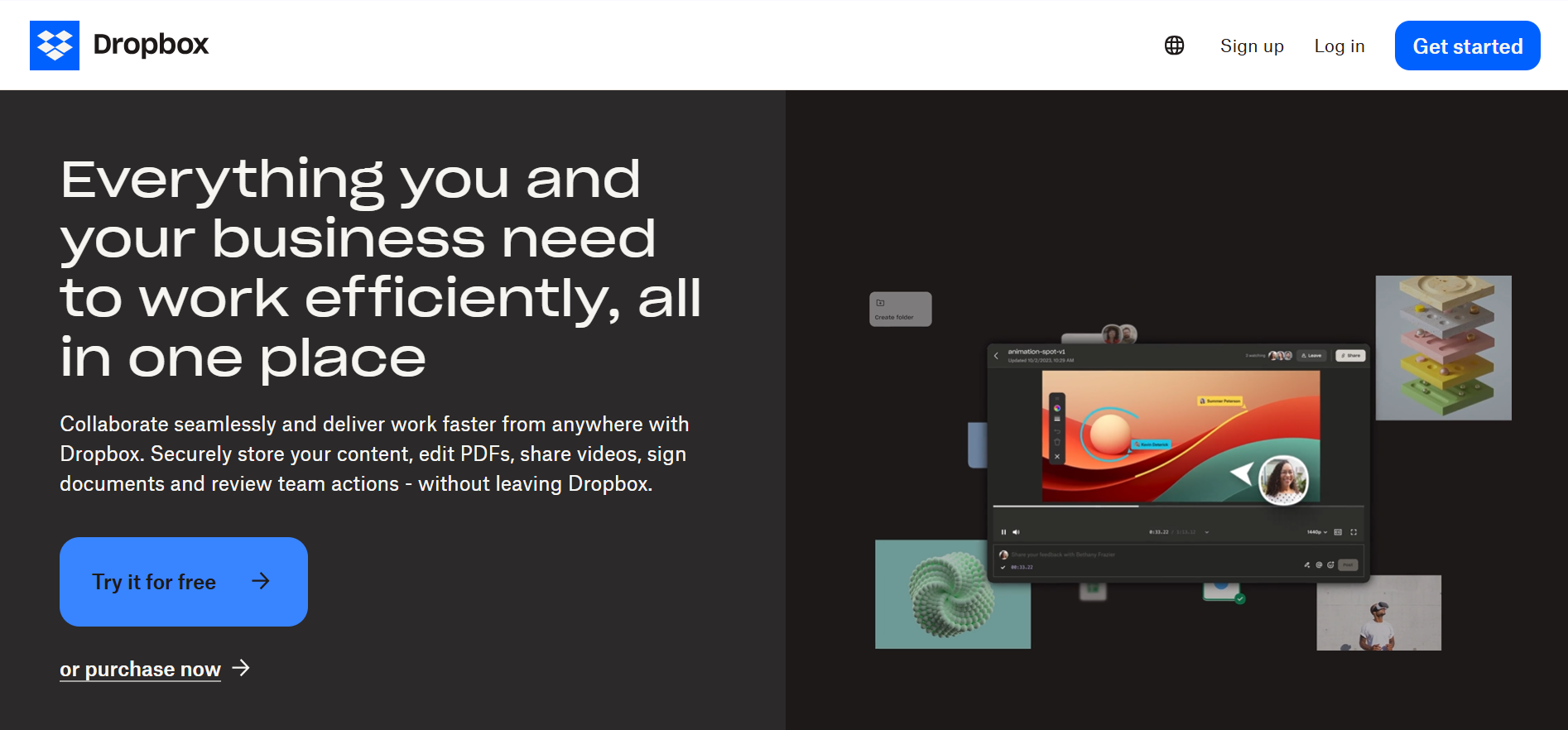
These features, therefore, make Dropbox suitable for individuals, small businesses, and teams who need cloud storage and file synchronization.
Its simplicity and integration with other apps make it suitable for both personal use and for remote workers who work with different apps and need to share files online with their team.
What is SharePoint?
- Document management: Central document libraries with version control, check-in/check-out, metadata tagging, and the ability to revert to prior versions.
- Team sites: Dedicated sites for teams and projects, including calendars, wikis, task lists, news, and custom web parts.
- Search: Advanced search across sites, libraries, and people, with AI-enhanced content understanding and metadata-aware queries.
- Workflows: Automate document reviews, approvals, and business processes using Microsoft Power Automate.
- Customization: Supports custom apps, forms, lists, flexible site layouts, and branding for business-specific needs.
- Integration: Seamless integration with Microsoft Teams, OneDrive, and the Microsoft 365 ecosystem.
- Security & compliance: Enhanced security with zero-trust access controls, AI-powered compliance monitoring, and refined permissions and governance tools.
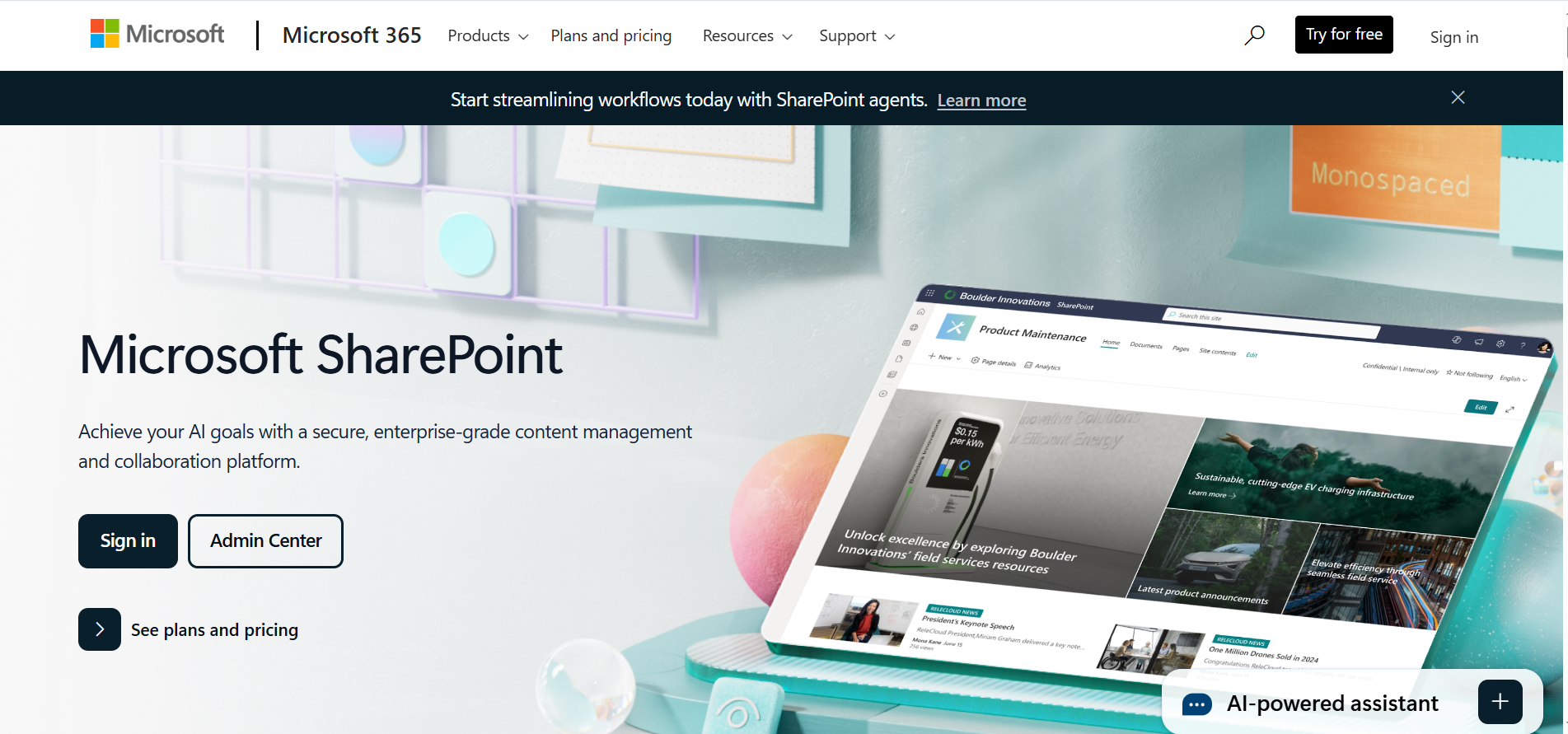
For SharePoint, its main use case is mostly aimed at businesses and organizations, especially corporate teams and departments. SharePoint helps these companies by centralizing documents, tracking file versions, allowing collaboration, automating workflows, and integrating with Microsoft 365.
SharePoint also provides strong security and compliance features to help companies prevent data breaches and compliance fines.
Dropbox vs SharePoint pricing
Below are the pricing options for Dropbox and SharePoint.
Dropbox vs SharePoint pricing
Dropbox pricing
| Dropbox Plan | Details | Users |
|---|---|---|
| Free | 2GB | 1 user |
| Plus – Personal | $9.99/month, 2TB of storage | 1 user |
| Professional – Professionals | $16.58/month, 3TB | 1 user |
| Standard – Teams | $15/user/month, 5TB | Multiple users |
| Advanced – Companies | $24/user/month, 15TB | 3+ users |
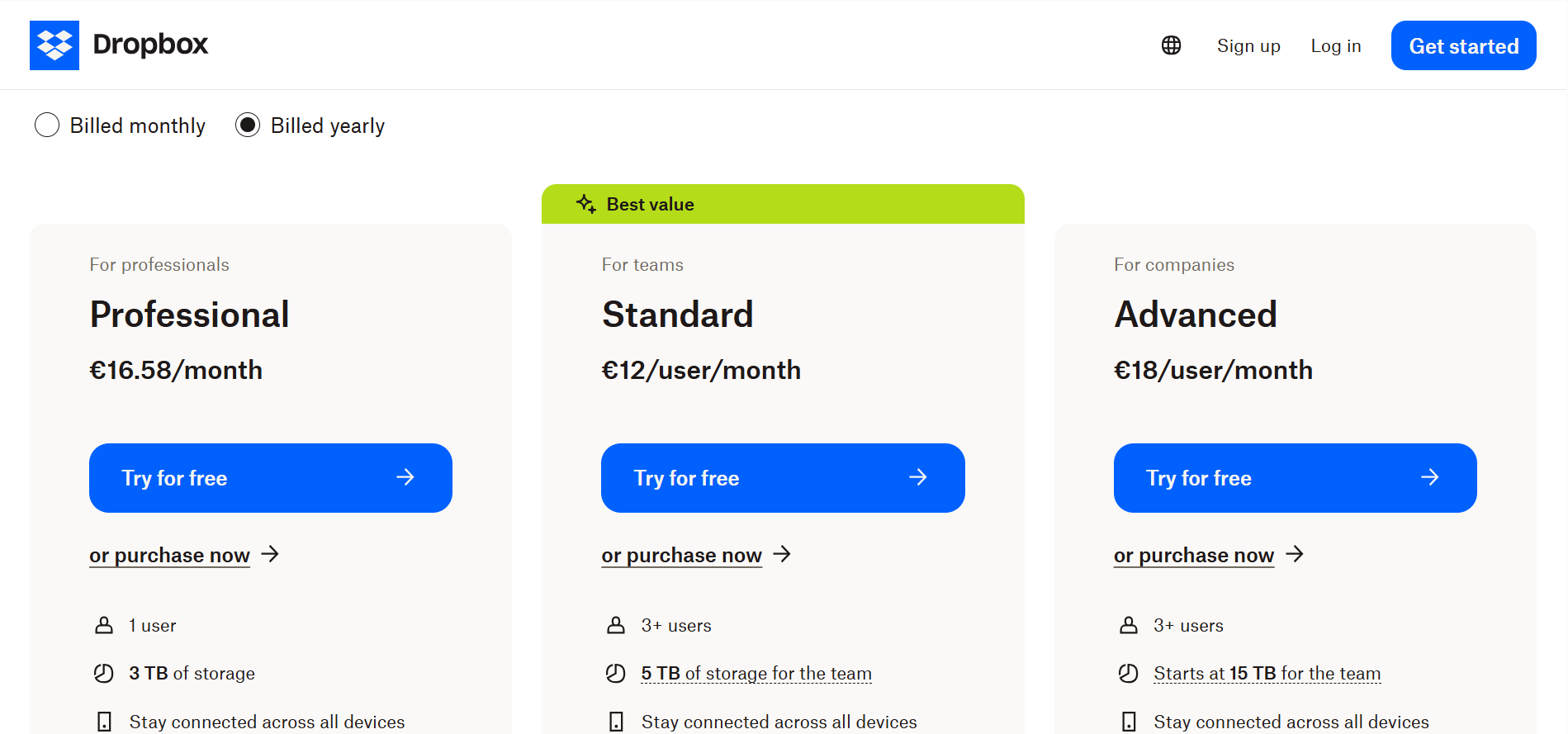
SharePoint vs Dropbox pricing
| SharePoint / OneDrive Plan | Details | Users |
|---|---|---|
| SharePoint Online Plan 1 | $5.00 user/month | 1 user |
| Microsoft 365 Business Standard | $12.50 user/month, 1TB | Up to 300 users |
| Microsoft 365 Business Standard (No Teams) | $10.25 user/month, 1TB | Up to 300 users |
| Microsoft 365 Copilot | $30 user/month, paid yearly | 1 user |
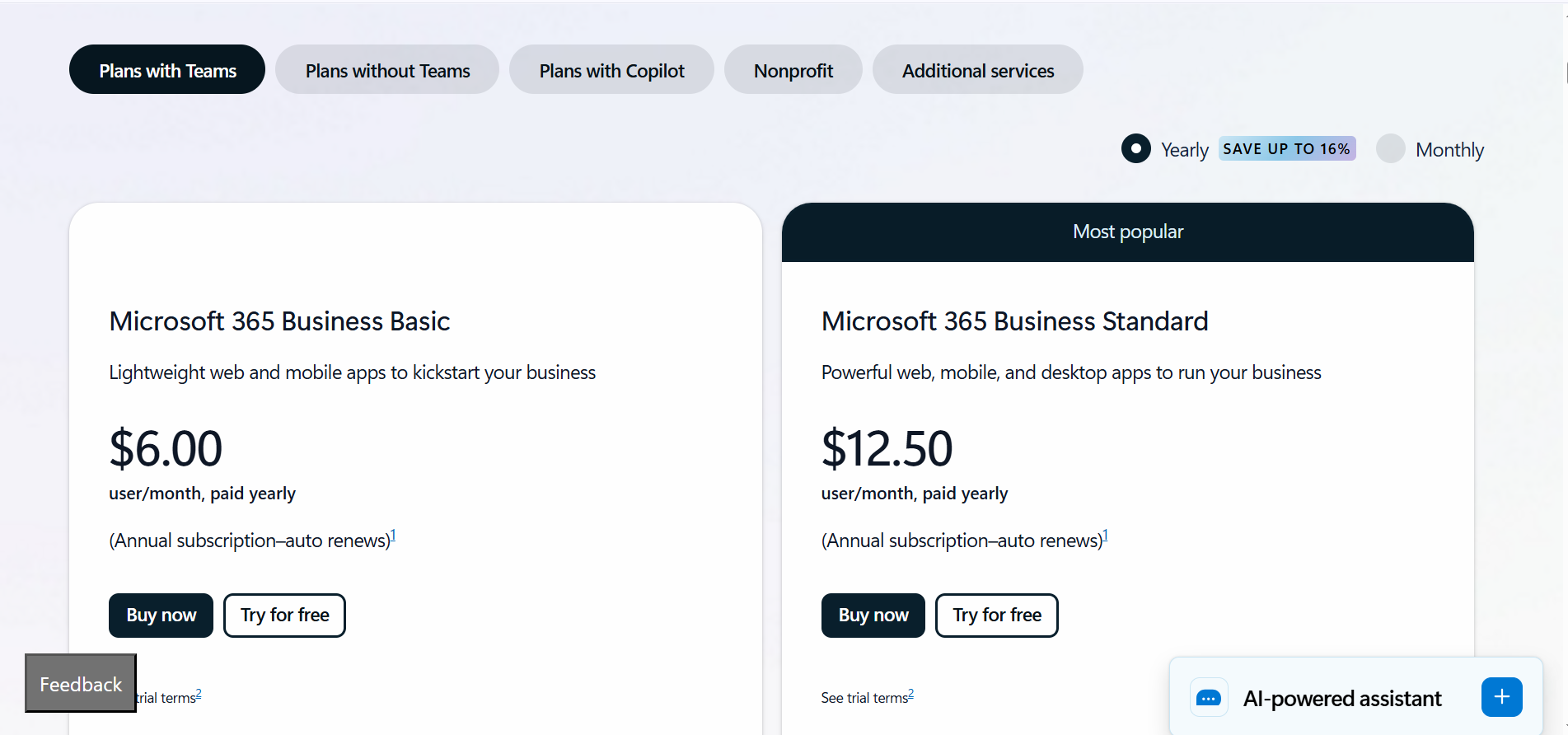
Dropbox vs SharePoint differences
Who are they aimed at?
Dropbox focuses on easy file storage, sharing, and syncing, so it’s mainly aimed at individual users, freelancers, and small teams.
SharePoint, part of Microsoft 365, offers advanced permissions, workflows, and integration with Microsoft tools like Teams and OneDrive, making it suitable for larger companies or enterprises.
In short, Dropbox is a simple, user-friendly cloud storage for personal and small team use, while SharePoint is enterprise-level collaboration and document management for businesses.
Ease of use
Dropbox is easier to use, and once you’ve set it up, you’re ready to go without too much of a steep learning curve, so anyone can use it without running into too many problems.
SharePoint is more complex and takes time to learn, so it’s better suited for users with some technical cybersecurity knowledge or IT support. This does come with a bigger payoff, as you get more control over the security of your account and files.
Customization
Dropbox offers limited customization as the platform’s layout and features are mostly fixed. The platform lets you organize folders, control sharing permissions, and integrate with third-party apps. Even so, Dropbox is designed for simplicity rather than deep customization.
SharePoint, on the other hand, is highly customizable, allowing you to tailor site layouts, workflows, permissions, and integrations to fit your internal processes.
It also allows you to create custom document libraries and automated workflows, so while it is more flexible, and can also be more complex to configure
Cost
For the basic starter plans, SharePoint is cheaper than Dropbox; however, for the most advanced plan, Dropbox works out cheaper and has more storage with more features designed with business owners in mind.
So, depending on your storage and features needs, you could save more with SharePoint, but you would get less cloud storage.
Integration
Dropbox integrates with popular third-party apps like Slack, Zoom, and Google Workspace, but its integrations are not as deeply connected or seamless as SharePoint.
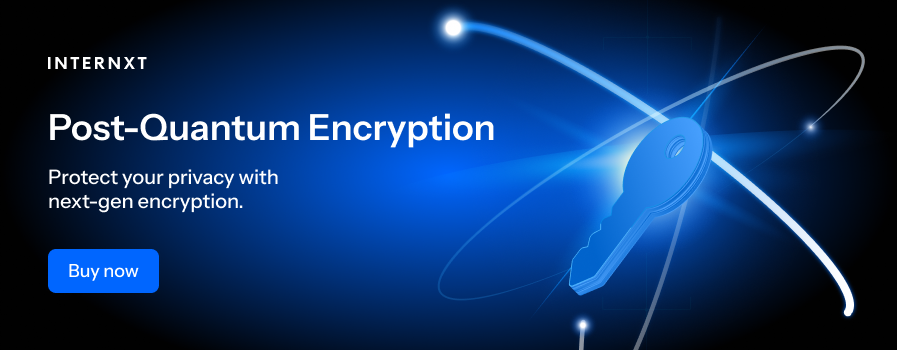
As SharePoint is part of the Microsoft ecosystem, it integrates easily with Microsoft 365 tools such as Teams, Outlook, and OneDrive.
Offline access
Dropbox offers reliable offline access as files and folders can be synced across devices to view and edit them without an internet connection.
While SharePoint does offline access, it usually requires syncing through OneDrive. Setting it up may require configuring data security permissions, so it can be more complex.
Access control
With Dropbox, you can set permissions to view or edit when sharing files or folders, and business plans include admin controls for managing users and monitoring activity.
SharePoint offers more advanced access controls, such as detailed permission settings at the site, folder, or document level. Administrators can assign roles, restrict access based on user groups, and integrate with company security policies, so it’s better suited for large organizations.
On-premises vs cloud
Dropbox is entirely cloud-based and there is no on-premises version available as all files are stored and managed on Dropbox’s servers with no on-premises version available. So setting up Dropbox is easy, but you’re limited as to where your data is physically stored.
SharePoint offers both cloud and on-premises options. With SharePoint Online, files are stored in the cloud as part of Microsoft 365. For businesses that want more control over their data, SharePoint Server allows companies to host data on their own servers for greater control and customization.
Search
Dropbox has a simple search function that works well for finding files and folders by name or content, but it lacks the advanced filtering and metadata options used in enterprise systems.
Dropbox has also introduced AI-powered tools like Dropbox AI and Dropbox Dash in its subscription plans. This feature lets you quickly find and summarize articles based on your prompts.
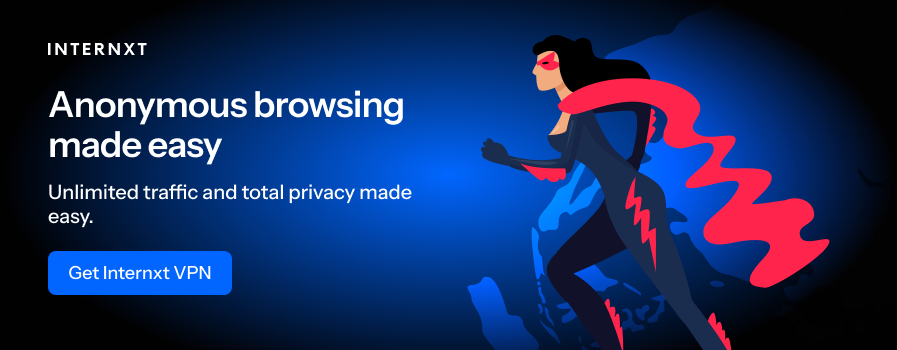
SharePoint includes a powerful enterprise search engine that can find documents, people, and sites across an organization. It supports metadata, filters, and indexing, making it much more effective for large-scale information management. With Microsoft 365 Copilot, SharePoint’s search also uses advanced AI to deliver personalized, context-aware results.
Automated workflow
Tasks like approvals, reviews, or automated notifications need to be handled manually or through third-party integrations with Dropbox, as it does not include automated workflow features.
SharePoint supports advanced workflow automation to create structured processes for document approvals, reviews, notifications, and task assignments.
SharePoint can handle complex multi-step workflows, making it ideal for businesses that need consistent, repeatable processes across teams without constantly needing manual intervention.
Alternative to Dropbox and SharePoint
For a zero-knowledge encrypted cloud storage plan for personal or business use, Internxt is becoming a popular alternative to Big Tech companies due to its commitment to user privacy.
One of the main benefits of Internxt is that it offers the same encrypted cloud storage for personal, business, and enterprise use.
Internxt personal plans
Internxt for personal use is broken down into three plans, all of which include post-quantum and zero-knowledge encryption, Antivirus, and VPN.
Essential €160
- 1TB encrypted storage
- Post-quantum encryption
- Zero-knowledge encryption
- Two-factor authentication
- Back up your computer
- Password-protected file sharing
- File versioning (Coming soon)
- Encrypted VPN (FR)
- Antivirus
Premium €260, includes everything in Essential plus:
- 3TB
- Invite, share & collaborate
- File versioning (Coming soon)
- Encrypted VPN (FR DE PL)
- Antivirus
- Cleaner
Ultimate, €360, everything in Premium and Essential plus:
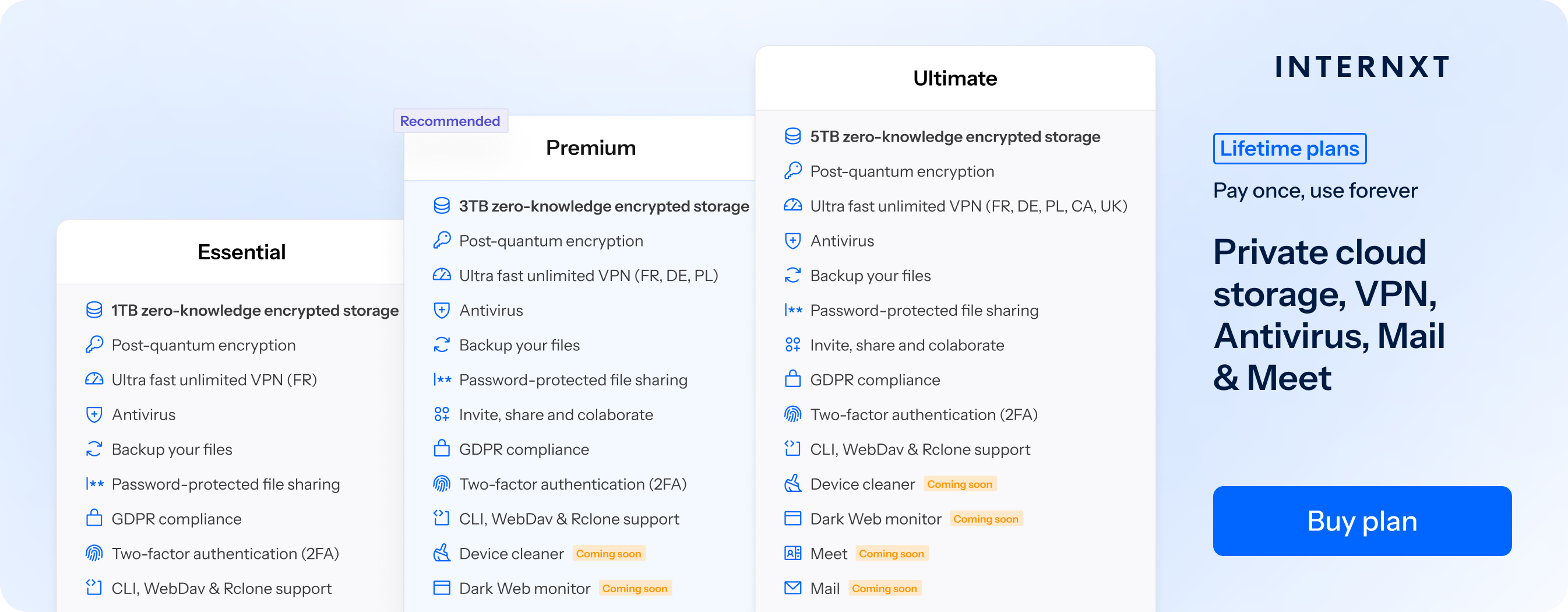
- 5TB
- Invite, share & collaborate
- File versioning (Coming soon)
- Encrypted VPN (FR DE PL CA UK)
- CLI, WebDav, Rclone & NAS support
- Antivirus
- Cleaner
- Meet
- Mail (Coming soon)
Annual or lifetime plans are available with Internxt, and lifetime plans can be paid for with cryptocurrency or with split payments through Klarna.
Internxt Business plans
Internxt business plans also offer the same security and privacy for businesses to protect their files and secure them against data breaches.
All Internxt plans are GDPR, ISO 27001, and HIPAA compliant, meeting the security needs for businesses regardless of their industry.
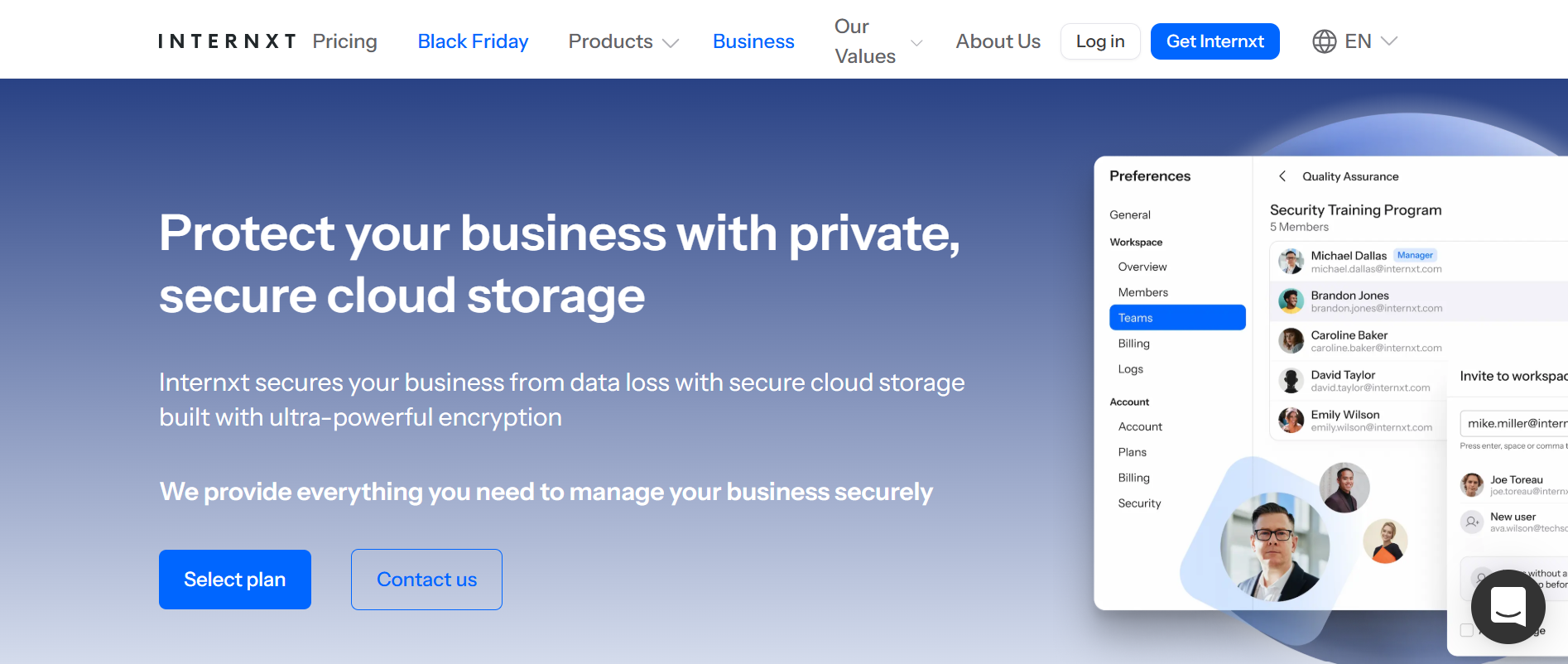
Business plans are available with monthly and annual plans at the following prices:
Standard €8/user/year
- 1TB encrypted storage per user
- Post-quantum encryption
- Zero-knowledge encryption
- Two-factor authentication
- Back up your computer
- Password-protected file sharing
- Invite, share & collaborate
- GDPR compliance
- CLI & WebDav
- Organization management
- Encrypted VPN
- Antivirus
- Cleaner
Business Pro €10/user/year, includes all features of Standard, plus:
- 2TB encrypted storage per user
- CLI, WebDav, Rclone & NAS support
- Organization management
- Encrypted VPN
- Antivirus
- Cleaner
- Meet
- File Versioning (Coming soon)
- Mail (Coming soon)
Internxt S3
Finally, for enterprise use, Internxt offers S3 storage. With this object storage solution, enterprises can store huge amounts of data and enjoy the advantages of hot cloud storage.
There are no egress or ingress fees, so you know exactly what you’re paying for. There are also no other charges for this service, and plans are charged €7/TB/month.
With this plan, you can scale your storage based on your company's needs, and get the same security and privacy to keep your files safe.
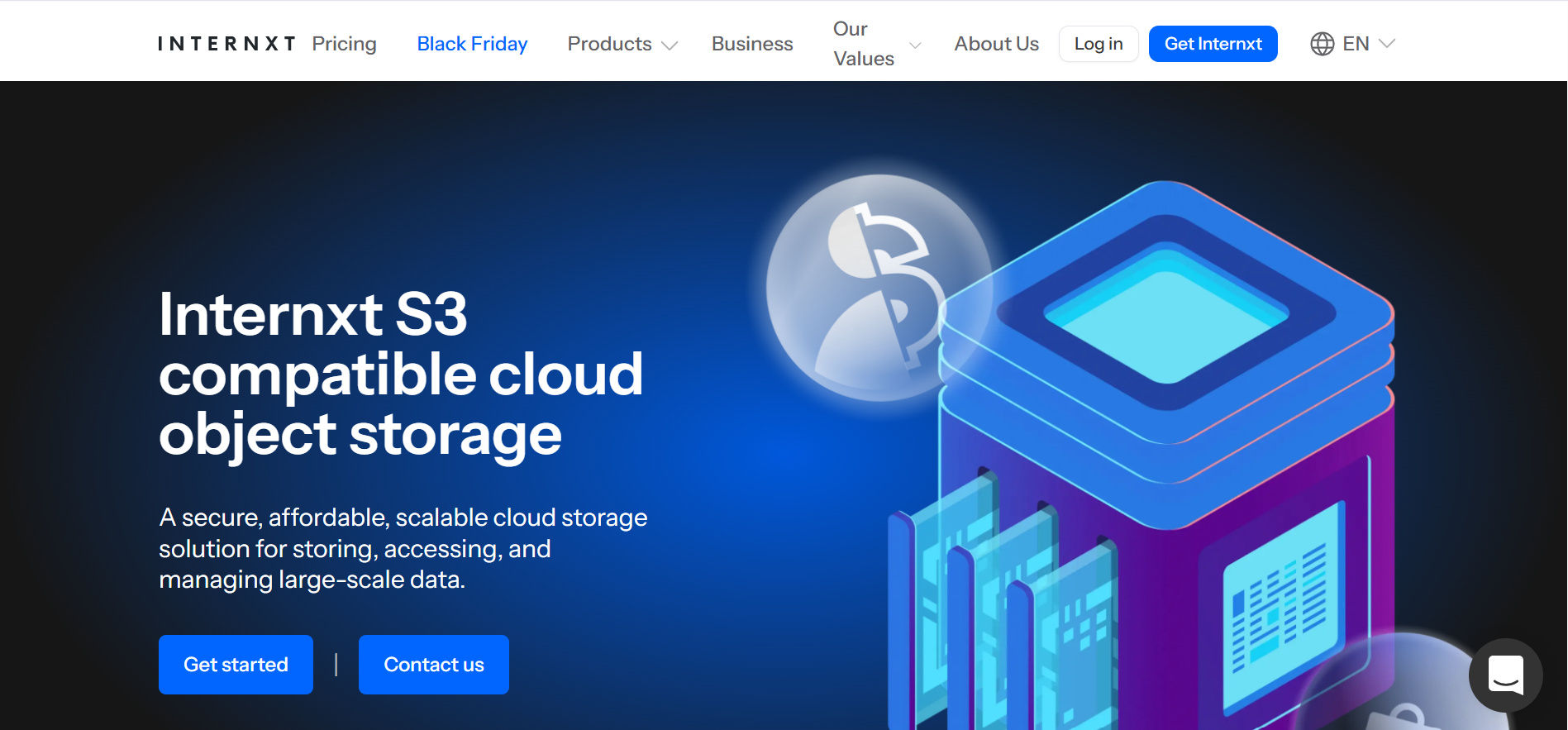
For more information, visit the Internxt website, where you can contact one of our dedicated sales specialists to find out how Internxt can help you store large amounts of data at an affordable price.
Dropbox vs SharePoint: How to decide
For large enterprises that require advanced features, security, and integration with Office 365, SharePoint is the better choice.
For smaller teams or personal use for cloud storage, syncing, and file sharing, Dropbox may be suitable, but it can be quite expensive.
For the best encrypted cloud storage that guarantees the privacy of your files, and a complete product suite for your online privacy, Internxt is the better choice for personal or business use.
For enterprises, Internxt S3 is also a solid choice and a cheaper alternative than AWS, Azure, or Google Cloud.
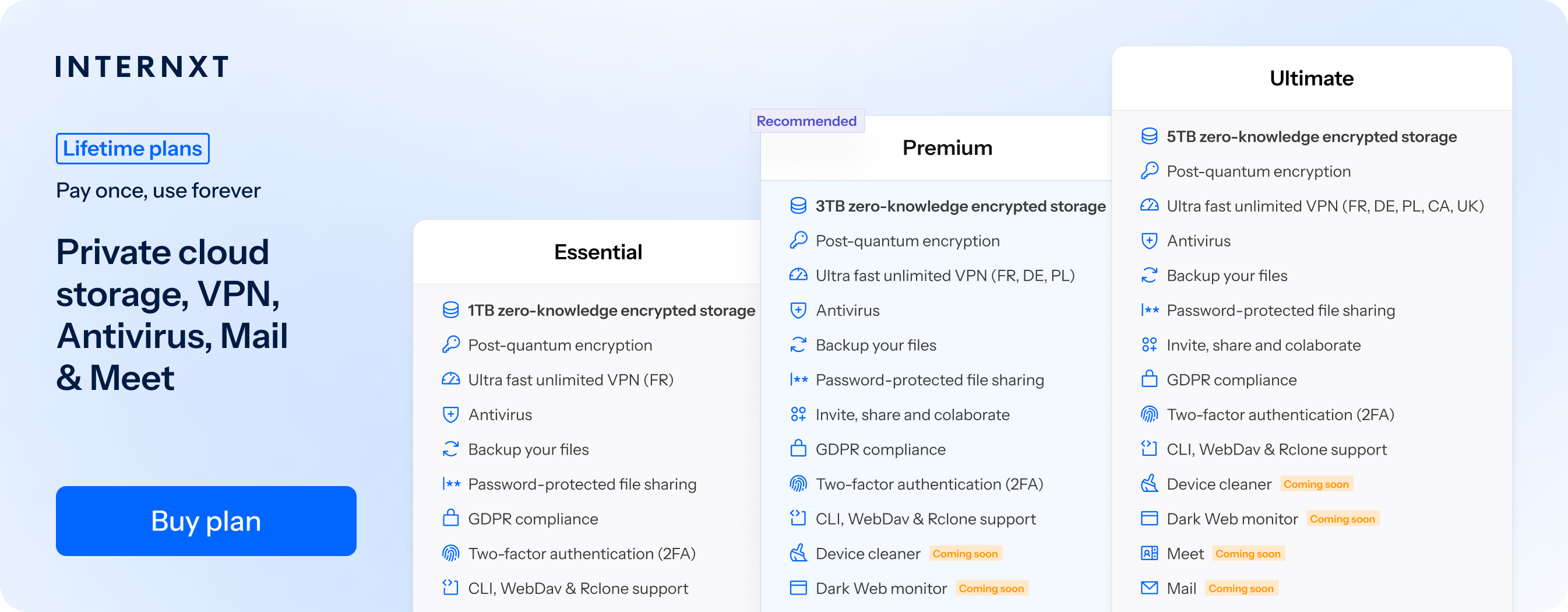
Before making your decision, narrow down your preferred choices and see which ones best match the features you need to avoid complex cloud migration later down the line.
Also of interest to you...

